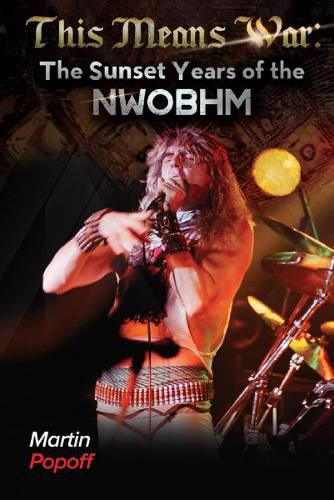Readings Newsletter
Become a Readings Member to make your shopping experience even easier.
Sign in or sign up for free!
You’re not far away from qualifying for FREE standard shipping within Australia
You’ve qualified for FREE standard shipping within Australia
The cart is loading…






This title is printed to order. This book may have been self-published. If so, we cannot guarantee the quality of the content. In the main most books will have gone through the editing process however some may not. We therefore suggest that you be aware of this before ordering this book. If in doubt check either the author or publisher’s details as we are unable to accept any returns unless they are faulty. Please contact us if you have any questions.
In This Means War: The Sunset Years of the NWOBHM, Martin Popoff and dozens of his UK rock buddies document the frenzied fruition years of the movement, namely 1981 and 1982, and then the many facets that caused the genre to implode by the end of 1984, with cracks in the armour beginning to appear the previous year. Why did metal disappear in Great Britain with the first hungover light on January 1, 1985? And where exactly did it go? The answers are enclosed, in the words of those who were there… and then nowhere fast!
Utilizing his celebrated oral history method-rich with detailed chronological entries to frame the story-Popoff blasts through all of the big events from 1981 to 1984, in this action-packed book that serves as concluding volume to Wheels of Steel: The Explosive Early Years of the NWOBHM-same easy reading format, same attention to documenting the subject at hand with visuals from the glorious era.
And by the way, this one’s way more packed with historical images, with more substantive text as well. It’s a beefy follow-up and conclusion to the well-received volume one, and the two together serve as a grand and exhaustive study of this momentous metal movement.
So come join Martin, along with dozens of the rockers themselves, as they together tell the tale of this ersatz genre’s maturity and demise, a demise that is ultimately laced with the pride that a platform had been created on which metal was to thrive for all of the rest of the loud “n’ proud "80s.
$9.00 standard shipping within Australia
FREE standard shipping within Australia for orders over $100.00
Express & International shipping calculated at checkout
This title is printed to order. This book may have been self-published. If so, we cannot guarantee the quality of the content. In the main most books will have gone through the editing process however some may not. We therefore suggest that you be aware of this before ordering this book. If in doubt check either the author or publisher’s details as we are unable to accept any returns unless they are faulty. Please contact us if you have any questions.
In This Means War: The Sunset Years of the NWOBHM, Martin Popoff and dozens of his UK rock buddies document the frenzied fruition years of the movement, namely 1981 and 1982, and then the many facets that caused the genre to implode by the end of 1984, with cracks in the armour beginning to appear the previous year. Why did metal disappear in Great Britain with the first hungover light on January 1, 1985? And where exactly did it go? The answers are enclosed, in the words of those who were there… and then nowhere fast!
Utilizing his celebrated oral history method-rich with detailed chronological entries to frame the story-Popoff blasts through all of the big events from 1981 to 1984, in this action-packed book that serves as concluding volume to Wheels of Steel: The Explosive Early Years of the NWOBHM-same easy reading format, same attention to documenting the subject at hand with visuals from the glorious era.
And by the way, this one’s way more packed with historical images, with more substantive text as well. It’s a beefy follow-up and conclusion to the well-received volume one, and the two together serve as a grand and exhaustive study of this momentous metal movement.
So come join Martin, along with dozens of the rockers themselves, as they together tell the tale of this ersatz genre’s maturity and demise, a demise that is ultimately laced with the pride that a platform had been created on which metal was to thrive for all of the rest of the loud “n’ proud "80s.